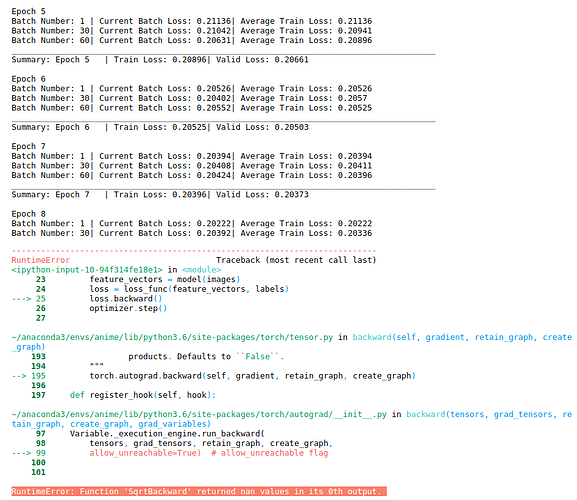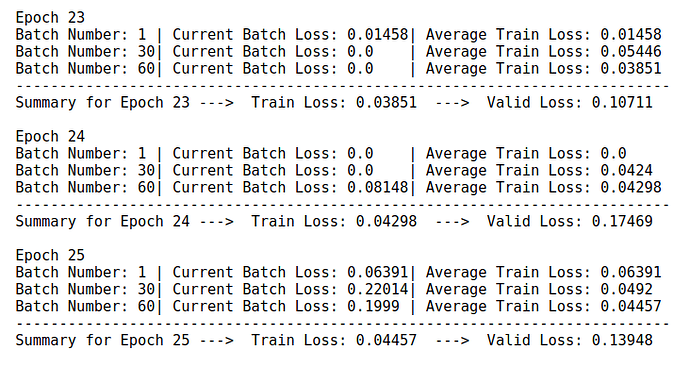Hi guys!
I have been trying to implement this paper which mentions triplet loss with batch hard mining for facial recognition.
Based on my understanding of the paper, I have written the loss function as follows
# https://arxiv.org/pdf/1703.07737.pdf
import torch
import torch.nn as nn
class batchHardTripletLoss(nn.Module):
def __init__(self, margin = 0.2, squared = False, agg = "mean"):
"""
Initialize the loss function with a margin parameter, whether or not to consider
squared Euclidean distance and how to aggregate the loss in a batch
"""
super(batchHardTripletLoss, self).__init__()
self.margin = margin
self.squared = squared
self.agg = agg
self.eps = 1e-8
def get_pairwise_distances(self, feat_vecs):
"""
Computing distance for every pair using
(a - b) ^ 2 = a^2 - 2ab + b^2
"""
ab = feat_vecs.mm(feat_vecs.t())
a_squared = ab.diag().unsqueeze(1)
b_squared = ab.diag().unsqueeze(0)
distances = a_squared - 2 * ab + b_squared
distances.clamp(min = self.eps)
if not self.squared:
distances = torch.sqrt(distances + self.eps)
return distances
def get_mask(self, labels, type_ = "positive"):
"""
Get a binary matrix corresponding to valid duplet pairs for
(anchor, positive) & (anchor, negative) pairs
"""
DEVICE = "cuda" if torch.cuda.is_available() else "cpu"
PK = labels.shape[1]
mask = torch.zeros(PK, PK).to(DEVICE)
for idx, item in enumerate(labels[0]):
for inner_idx, inner_item in enumerate(labels[0]):
if type_ == "positive":
# Labels should match and the image index shouldn't be the same
if (item == inner_item) and (idx != inner_idx):
mask[idx, inner_idx] = 1
elif type_ == "negative":
# Labels must be different and image index shouldn't be the same (redundant but still...)
if (item != inner_item) and (idx != inner_idx):
mask[idx, inner_idx] = 1
return mask
def forward(self, feat_vecs, labels):
"""
Define the loss function implementation here
"""
DEVICE = "cuda" if torch.cuda.is_available() else "cpu"
# Get the pairwise distances of all images from one another
distances = self.get_pairwise_distances(feat_vecs)
# Get the toughest positive pair by first filtering out the (anchor, positive)
# pairs using the get_mask routine and then find the max across rows
positive_mask = self.get_mask(labels, type_ = "positive").to(DEVICE)
toughest_positive_distance = (distances * positive_mask).max(dim = 1)[0]
negative_mask = self.get_mask(labels, type_ = "negative").to(DEVICE)
# Add the maxiumum negative distance to all the non-valid pairs
# on a rowwise basis and then out of them whichever is the minimum
# will be our pair distance corresponding to toughest (anchor, negative) pair
max_negative_dist = distances.max(dim=1,keepdim=True)[0]
distances = distances + max_negative_dist * (1 - negative_mask).float()
toughest_negative_distance = distances.min(dim = 1)[0]
# Find the triplet loss by using the two distances obtained above
triplet_loss = (toughest_positive_distance - toughest_negative_distance + self.margin).clamp(min = self.eps)
# Aggregate the loss to mean/sum based on the initialization of the loss function
if self.agg == "mean":
triplet_loss = triplet_loss.mean()
elif self.agg == "sum":
triplet_loss = triplet_loss.sum()
return triplet_loss
However when I go to training, the training runs smoothly for the first few epochs but later, it starts throwing RuntimeError: Function 'SqrtBackward' returned nan values in its 0th output. this error. Here’s a screenshot of the same.
I tried to follow this thread and added a small epsilon quantity before taking square root to make sure it’s non-zero but it still didn’t work…
Can someone please guide me on how I can tackle this issue? I would be highly obliged.
Thanks ![]() !
!

